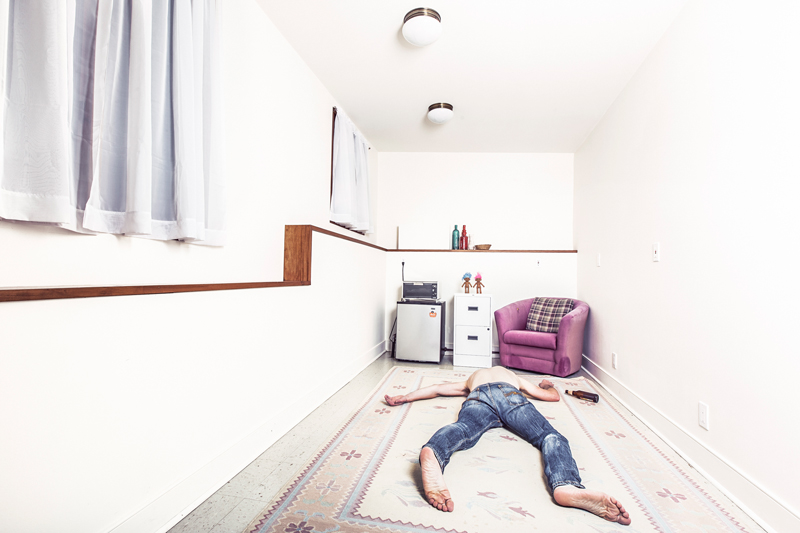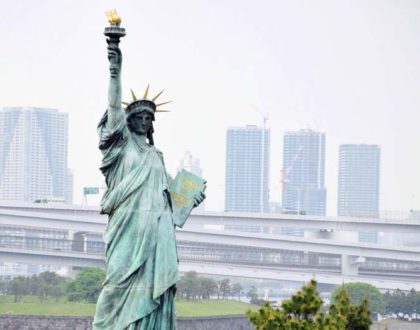How to save when moving into a Japanese Apartment

by Madelaine
Moving in Japan is not cheap. When I looked for my apartment in Tokyo, I felt overwhelmed by the various fees I was asked to pay. It felt like my bill just kept blowing up.
I wager you would rather know what you are in for and find out how to avoid ending up like the poor guy in the title picture (at least his place looks clean).
That’s why:
- Schedule at least 4-5months rent or
- ¥400.000 (assuming a monthly rent of ¥80.000) for moving costs.
- Estimate your own needs based on your rent and the furniture, etc. which you intend to buy.
The first time I moved, I didn’t understand the purpose of all that money I was supposed to pay. The pressure of the real estate agent to make my decision on that very day did not help either.
After going through the whole process once and doing some research, I now would do many things differently, so let me share with you what I learned on how to save a few Yen.
コンテンツ
Saving on the move
Finding an apartment that meets all saving tips in this article will be about as possible as finding the perfect place itself.
But even just 1 or 2 points below can knock off more than 1-2months rent from your moving costs!
How to save on the move
- ✔ Move off-season in April-September
If you can, try not to house-search in February-March. As most Japanese move before the start of the new school year, it will be easier to find discounts later-on. - ✔ Look for “one month rent-free” campaigns.
- ✔ Avoid places with 礼金 (monetary gift).
- ✔ Search for real estate agents that don’t ask for a 仲介手数料 (agent’s commission).
Move in costs
To help with your own budgeting, let me explain the fees included in the above grand-total of renting.
1. First month’s rent
When moving, the amount of money you have to pay just for rent is often underestimated.
- ■ Rent for your old place
- ■ First month’s rent of the new place (first full calendar month)
- ■ Daily rent for the month you move. In Japan, you usually don’t pay for the whole month, but pay your first rent based on the days left, starting with your move-in date.
Like this, rent can accumulate to three months’ worth payable upfront.
2. 敷金 Security Deposit
■ This fee is required for 67% of apartments.
■ Cost: up to 1 month’s rent at 50% of all flats,
up to 2 month’s rent at 30% of all flats. (This fee tends to increase with apartment size.)
The security deposit (敷金) is the money your landlord can use to cover eventual damages occurring during your stay. When you leave the place in perfect condition you should get the full amount back. Otherwise, you will be returned what money is left after your landlord‘s expenses. Places may also deduct a fixed cleaning fee from your deposit.
Be sure to check the conditions for your security deposit and cleaning fees in advance, to avoid any bad surprise when moving out.
3. 礼金 Monetary gift
■ Required for less than 50% of apartments, seems to be decreasing
■ Cost: up to 1 month’s rent at 70% of all flats,
up to 2 month’s rent at 20% of all flats.
I saw this translated as key money online in some places, but it is actually something entirely different. 礼金is a fee you pay to your landlord as a sign of appreciation that you got the apartment. It is not refundable.
4. 仲介手数料 Agent’s commission
■ Cost: up to 1 month’s rent (excluding monthly maintenance fees etc.), in most cases effectively 0.5 month’s rent.
The agent’s commission (仲介手数料) is the money you pay your realtor when you sign the lease. The commission is payable as completion bonus, only in case of a successful placement. Until then, counseling, apartment viewing, and other realtor services are free of charge.
Since many agents can introduce you to the same properties, you can try to find one that is doing a “no commission” campaign or try contacting the managing company directly (the latter is not always possible and some serious Japanese skills are advisable).
5. 保証料 Guarantor company fee
■ Cost: 0.5 month’s rent (including maintenance fees etc.)
Assuming that you don’t have close relatives who happen to be Japanese nationals, usually, you will have to sign up with a guarantor company. The guarantor’s role is to vouch for you, and if necessary pay, if for any reason you stop paying rent as agreed. For taking this risk on your behalf, you pay them the guarantor company fee (保証料.)
Normally your realtor will recommend a company to you, but you can also search online yourself.
The contract must be renewed yearly, with an annual renewal fee of around ¥10.000. Sometimes universities or employers can also act as guarantors. In this case only remember that if you decide to change jobs, you will have to change your apartment, too.
6. 管理費・共益費 Property maintenance fee
■ Cost: 5-10% of monthly rent (recurring payment)
The maintenance fee (管理費, or 共益費) is paid by everyone living in the complex to cover maintenance and repairs of the building and common spaces, like the lobby.
Make sure to check for this! The rent for some apartments may seem too good to be true because it is. There are places (also share-houses) in good locations which seemed to be great deals until one noticed that the maintenance fee was another 50% on top of the monthly rent cost.
7. 火災保険料Fire/Renters Insurance
■ Cost: ~¥20,000 for 2 years (varies by insurance company)
The fire insurance (火災保険料) is for your financial protection in case of fire and water damage. You will have to enter it when you sign your lease and for the duration of your contract.
8. 消毒料(しょうどくりょう)Sterilization fee
■ Cost: ¥10,000-¥20,000
Standard cleaning procedure (消毒料) to get rid of insects or microorganisms. Cleaning fees come in various versions – when moving-in, when moving-out, standard, sterilization, etc. For me, being used to clean and paint an apartment myself before moving-out, this felt like another highly unnecessary fee. That is until I saw some apartments that were waiting for their new tenants before the cleaning procedure. It might seem like an unnecessary expense, but you will be happy with the result.
9. 鍵交換費用 Lock Exchange fee
■ Normal lock: around ¥18,000
■ Auto-lock: ¥20,000-¥30,000
The 鍵交換費用 is an optional fee, only payable if you wish to have a new lock. Since exchanging the lock is safer, your realtor might recommend having it done or consider it a standard.
10. 更新料 Lease renewal fee
■ Cost: varies: check your contract for details before signing the lease.
When you sign your lease, you sign for 2 years or another fixed time frame. If you wish to extend your lease, you will have to pay a renewal fee (更新料). There are cases where a 更新手数料 payable to the real estate agent will also be required, when extending your lease. Make sure to check your contract for conditions and amounts.
Total move-in cost
Example calculation in case of an apartment, costing¥70,000 plus ¥5,000 maintenance fee per month and assuming average prices, without discounts.
| Fees | Estimate | Total |
| Rent, old place | Pay by day | ¥37,500 (15days ) |
| Rent, moving month | Pay by day | ¥37,500 (15days ) |
| Rent, first month’s | 1 month | ¥75,000 |
| Deposit | 1 month | ¥75,000 |
| Monetary gift | 1 month | ¥75,000 |
| Agent’s commission | 0.5 month | ¥37,500 |
| Guarantor fee | 0.5 month | ¥37,500 |
| Fire Insurance | fixed | ¥20,000 |
| Cleaning fee | fixed | ¥10,000 |
| Cleaning fee | fixed | ¥20,000 |
| Total | ¥425,000 |
Other move-in costs to consider
One time costs
Around ¥100,000 are recommended to buy necessary furniture and appliances when starting to live alone.
What you might need to buy:
- ✔ Furniture (bed, pillows, futon, curtains, table, storage)
- ✔ Appliances (fridge, stove, microwave, rice cooker, washing machine, lighting fixtures, etc)
- ✔ Oversized garbage disposal fee – remember that everything you buy now, you will later need to pay for again when you don’t need it any longer.
- ✔ Small things (hangers, clothespin, laundry detergent, fabric softener, tableware, etc.)
Try to get these at 100Yen shops like Daiso or Seria. It will cost you around ¥5,000-¥10,000 to get all necessary items, including some toiletries and so on.
In my case, I was just so in awe of the variety in these shops I ended up using ¥10,000 to equip my first furnished room in Japan, with all the necessities of daily life.
Additional monthly costs
- ✔ Bicycle or car parking spots fee
- ✔ Utilities (costs for using your AC can spike in summer and winter)
- ✔ Internet
I hope with this list you can untangle your moving costs in Japan and save a few bucks when signing that lease!
If this was helpful to you, please share with your apartment-hunting friends!
And, as always let me know in the comments, what experiences you made while renting an apartment in Japan.
Recommended Posts

May Sickness: A Japanese Phenomenon
10 5月 2021 - Daily Life, Life


